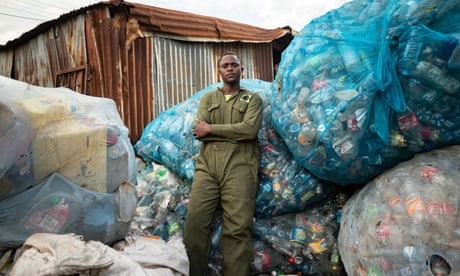Limits on numbers at Paris summit mean some of those ‘most needing to be heard’ will not be in attendance.
Scientists and NGOs have accused the UN’s environment programme (Unep) of locking out those “most needing to be heard” from upcoming negotiations in Paris aimed at halting plastic waste.
Last-minute restrictions to the numbers of NGOs attending what the head of Unep described as the “most important multilateral environmental deal” in a decade will exclude people from communities in developing countries harmed by dumping and burning of plastic waste as well as marginalised waste pickers, who are crucial to recycling, from fully participating, they said.
The groups criticised the agency for publishing a report this week, before negotiations between 193 countries over 29 May to 2 June, which they claimed did not fully reflect the health and environmental effects of plastic pollution. The report said mismanaged plastic waste could be slashed by 80% by 2040.
Scientists’s Coalition for an Effective Plastics Treaty (Scept), representing 200 scientists who were invited to comment before the report’s publication, said their concerns and criticisms were ignored.
Unep said it regretted that “due to a technical issue” an email containing Scept comments was not received in time for publication. However, it said it received feedback from 75 experts from 39 organisations that were incorporated. It denied claims its report did not sufficiently reflect the health and environmental impacts of plastic.
Rich Gower, a senior economist for Tearfund, an international NGO that provides advocacy and support to waste pickers, said: “This last-minute restriction locks out those who most need to be heard. It’s vital that negotiators hear from those with firsthand experience of plastic pollution: waste pickers, communities harmed by dumping and burning, and those living near toxic production plants.
“Without these groups’ voices the treaty will fail to be the life-changing instrument we desperately need it to be.”
The Tearfund partner and campaigner Tiwonge Mzumara-Gawa, from Malawi, who will now share a pass with four colleagues after NGOs were told only one in five people would have access to negotiations, said: “World leaders must hear real stories from people in countries where the plastics treaty could have a life-changing impact. In Malawi we don’t have organised public waste collection and many people are forced to either dump or burn their waste. It’s extremely disappointing that my colleagues and I will now have much less access to these talks.”
Therese Karlsson, a science adviser at International Pollutants Elimination Network and member of Scept, said: “We were asked to review the report. Thirty scientists provided over 300 comments. We have several major concerns, one around the framing of the report, which is very focused on technological solutions in a very optimistic way, even although those technical solutions are not proven.”
Source: The Guardian

